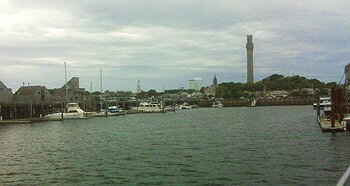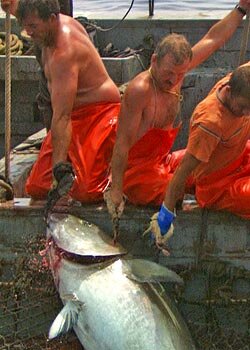Tag Archive for 'fishermen'
Rome, Italy. June 9
Based on the announcement today that the European Union’s industrial fishermen have already reached their share of this year’s Atlantic bluefin tuna catch and must return to port at midnight tonight, WWF points out that this indicates the huge overcapacity of fleets - and is urging fishing countries to scrap their industrial vessels as soon as possible.
High-tech purse seine fishing boats - whose vast sack-like nets encircle shoals of bluefin tunas as they gather to spawn - set off for the high seas on May 15, but bad weather prevented them from catching any fish for the first ten days. The season was due to close a month later, on June 15.
“This early closure of the EU’s Atlantic bluefin tuna purse seine fishery does not point to recovery of the fish - it points to the gross overcapacity of fleets,” said Dr Sergi Tudela, Head of Fisheries at WWF Mediterranean.
“That EU purse seine fleets have in the space of a week caught their whole annual quota of bluefin tuna in the Mediterranean is further proof that these boats are simply not appropriate for this fishery and that the whole operation is entirely unsustainable - not to mention economically unviable.”
France’s purse seiners, for example, had already caught 1,456 tonnes by June 8 - some 86 per cent of their quota for the year - while Spain’s had caught 728 tonnes, over 90 per cent of their quota.
“Purse seiners are so hyper-efficient they leave no chance to the tunas they target in the peak spawning period when the fish are at their most fragile,” said Dr Tudela.
“The fact that these high-tech vessels are kept idle in port for more than 50 weeks a year is a total absurdity and shows the boats’ non-compatibility with a fish stock that is heavily depleted and in urgent need of recovery. The only reason the boat owners can afford to go out on the water at all is that they were largely built thanks to extensive EU subsidies in the first place.”
“WWF is calling for an immediate phase-out of purse seining in this fishery - and will use every lever at its disposal to push members of the International Commission for the Conservation of Atlantic Tunas (ICCAT) when they meet in November in Paris to set the scrapping process in motion at once.”

A Greenpeace activist had to be airlifted to hospital after having a boat hook slice through his leg during violent clashes at sea with fishermen.
French fishing crews sank two Greenpeace inflatables and badly damaged another as the conservationists tried to prevent them catching Atlantic bluefin tuna.
Frank Hewetson, an activist on one of seven inflatables deployed by Greenpeace for the operation, was badly hurt when a gaffe hook pierced his leg.
He was then hauled the length of an inflatable as a fisherman pulled on the gaffe hook to bring the vessel closer. Greenpeace remains uncertain whether the injury was deliberate or an unintended consequence of wielding dangerous equipment in a close-quarters encounter.
In turn, Jean-Marie Avallone, the owner of French fishing boats, claimed a fisherman had been hurt when the Greenpeace vessel Arctic Sunrise rammed a trawler during a further clash yesterday.
Members of the conservation group questioned the claim and said they were unaware of any collision.
Mr Hewetson, who remains in hospital in Malta, was injured on Friday as activists attempted to free endangered bluefin tuna from a seine purse net and were met with a robust and armed response from the fishing crews.
Willie Mackenzie, an activist on board, wrote: “The fishermen reacted with a shocking level of violence and complete disregard for anyone’s safety. They attacked our inflatable boats.”
Olly Knowles, another activist trying to disrupt the tuna fishing fleets in the Mediterranean, said today: “Frank got a boat hook all the way through his leg. It made quite a hole. “A lot of the fishermen were very seriously armed with knives, clubs, and harpoons. There was a real intention to defend the net.”
The second confrontation took place yesterday as a cage full of bluefin tuna was towed towards the Tunisian coast to be added to a tuna ranch - where the live fish are fattened up for sale.
Greenpeace tried to cut away some of the ropes holding the net in place but they were again met by a robust response from the crews: “We were met with a less violent but still vigorous defence.”
It is the first time that Greenpeace has tried to free bluefin tuna from nets or cages and it marks a change in tactics for the group which has been frustrated by the continued failure of the European Union to stop issuing tuna quotas.
Atlantic bluefin tuna numbers are estimated to have slumped by at least 80 per cent since the Industrial Revolution and they have been especially hard hit by purse seine fishing. Research suggests fisheries are close to collapse and there are fears the fish may never be able to recover if severe limits on catching it are not introduced soon.
Fishing crews have been issued with month-long licences to catch bluefin tuna, which can fetch up to £100,000 each, until June 15 as the fish move into the Mediterranean from the Atlantic to spawn.
A spokesman for the Federation of Malta Aquaculture said: “The fishermen were acting within their rights and were doing nothing to provoke attention by these activists except for the fact that they were carrying exercising their trade.
“Greenpeace cannot pretend that such actions are measured and or peaceful. They are pure and simply designed to cause economic loss with violence against innocent operators.”
Atlantic bluefin tuna, Thunnus thynnus, can swim at speeds of more than 40mph, reach more than 13 feet in length, and weigh more than 550lbs, but numbers are dwindling.
Watch a video clip here
By Lewis Smith

I write this while looking out over the sea at Cape Cod realising that it is here along this coast that we humans have done the most damage to fish stocks.
Cod is the history of this coast and its people. It is utterly beautiful here in Provincetown where The End of the Line is being screened as part of the their film festival.
Despite wind and rain - yes, like the UK - this is a community that was founded on fishing bounty. It now lives on tourism.
My co-speaker at the Q&A was Owen Nicols, a young man who was born and bred here in Provincetown. He is studying for a PHD in Fisheries Science and works at the local Oceans Institute.
Continue reading ‘Cape Cod - where humans have done the most damage to fish stocks’

One of the world’s rarest sharks has been eaten after being accidentally caught in fishing nets in south-east Asia.
Only 40 other sightings of the shark have ever been recorded, according to the World Wildlife Fund.
The 500kg, four metre megamouth shark died while struggling in the fishermen’s net on 30 March off Burias island in the central Philippines. Read more at Guardian Environment.

Vessels catching mackerel around the Scottish coast have been awarded certification by the Marine Stewardship Council, recognising that their landings are from well-managed stocks.
This follows the certification of North Sea herring last year as a well managed stock that people can eat without fear that they are destroying the stock or destroying other species as by-catch.
The Scottish Pelagic Sustainability Group is responsible for Scotland’s largest individual catches of fish. They landed 95,700 tons of mackerel in 2007. Smoked, frozen and fresh mackerel will soon be on sale bearing the MSC logo meaning that it can be traced back to the independently certified SPSG fishery.
John Goodlad, chairman of the Group, said: “This is another defining moment for the Scottish pelagic industry as it establishes its environmentally responsible credentials.”
Continue reading ‘Eco-label awarded to UK mackerel fishery’

US domestic trade legislation could be used to save the Atlantic bluefin tuna after the failure of an international body to restrict rampant over-fishing of the endangered species.
Conservationists and concerned scientists are discussing applying for a US import ban after a UN-recognised body set up to manage Atlantic and Mediterranean tunas awarded fishermen a total allowable catch in excess of what scientists recommended amid warnings that the stock could collapse.
Member nations of the International Commission for the Conservation of Atlantic Tunas awarded fishermen in the Mediterranean and Eastern Atlantic a quota of 22,000 tons this year against a scientific recommendation of 8,000-15,000 tons.
The United States is now a net importer of bluefin tuna, which would mean import restrictions against fish caught and ranched in the Mediterranean could have an effect on reducing international trade and placing pressure on other nations to follow suit.
Options being discussed by conservationists include a listing under the US Endangered Species Act and a listing under Appendix II of the Convention on International Trade in Endangered Species (CITES), which restricts trade in caviar and elephant ivory, but both of these would be hotly opposed by fishermen and fishing nations.
A resolution by the UN general assembly to reduce catches of bluefin tuna is another option under consideration.
Andrew Sharpless, executive director of Oceana, said: “ICCAT has shown that its true name is I CAN’T. It can’t find the courage to save the bluefin tuna from being commercially hunted and killed to where it is in danger of disappearing forever. Continue reading ‘US trade embargo could save bluefin tuna’

![]()




